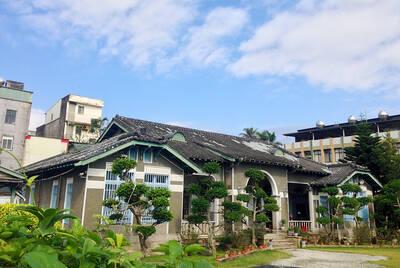Hesitantly, with help from her teacher, Lyudmila Propishchan managed to string together a few basic phrases in Kazakh.
For this musician from Kazakhstan, an ex-Soviet Central Asian country where Russian is widely spoken, learning the local language is hard work, but she is keen to try.
“In Kazakhstan, not everyone is fluent in Kazakh. I started learning a month and a half ago and my aim is to be able to hold a conversation,” said the 44-year-old violinist.

Photo: AFP
Like most other Central Asian languages, Kazakh is a Turkic language unrelated to Russian but written in the Cyrillic alphabet with some additional letters.
More than three decades after the end of the Soviet era, during which Russian became the lingua franca and the language of the elite, long-sidelined national languages are making a comeback in this region.
While Moscow still views Central Asia as its backyard, people here are increasingly turning towards their national heritage.
Out of a population of 20 million, Kazakhstan has around three million ethnic Russians.
Only half the population uses the Kazakh language in everyday life, according to the authorities. Propishchan takes a Kazakh language class in Karaganda, the main city of the vast industrial region of the same name, with around 20 other adults.
During the lesson, taught in Russian, some whisper to each other about tricky grammar points.
“In Karaganda, Russian used to be everywhere, we didn’t use Kazakh. But nowadays the language is being revived,” said Lydia Khan, a 68-year-old taking a class.
“People are surprised that I’m learning Kazakh at my age,” she added.
“I tell them that this is my country and that I want the language to develop.”
Yakub Dzhamalov, a young local councilor, said that he “grew up in a Russian-speaking environment” but now feels it is his “duty” to learn Kazakh.
SURPRISE FOR PUTIN
The decline of Russian in favor of Central Asian languages is undoubtedly linked to demographic change.
In Kazakhstan, the ethnic Russian population has fallen over the last 30 years from about 38 percent to 15 percent. In other Central Asian countries, it is no more than five percent.
Russia’s invasion of Ukraine and the imperialist rhetoric of many Russian officials, including their calls to protect Russian-speaking minorities in ex-Soviet countries like Ukraine, have also prompted Central Asian countries to work harder on reviving their national languages.
Since 2023 it has been compulsory for Kazakh and Kyrgyzstan officials to master the national languages, which are also being used more widely by media.
The Kazakh president’s party also offers free language courses, sometimes with monetary incentives.
In Karaganda, local authorities organize fun competitions such as “declare your love in Kazakh and win a romantic break” or “read a book in Kazakh and win an iPhone.”
On social media there are also numerous channels for learning Kazakh.
In a symbolic first, Kazakh President Kassym-Jomart Tokayev chose to use Kazakh at a joint press conference with Russian counterpart Vladimir Putin in autumn 2023.
This seemed to surprise Putin — who is used to regional leaders speaking to him in Russian — and caused a comical scene as Kremlin insiders scrambled to put on earpieces to listen to a translation.
EVER-PRESENT RUSSIAN
But Russian is still widely used in Kazakhstan, which shares a 7,500km border with Russia, and is an official language alongside Kazakh.
Russian is heard constantly in public life, the arts, education and business.
The situation varies in other Central Asian countries.
Kyrgyzstan gives Russian similar official status, while in Tajikistan Russian is “the language of inter-ethnic communication.”
In Uzbekistan and Turkmenistan, however, Russia has no official status but is still used.
Throughout the region, Russian remains associated with social aspiration: giving access to better jobs at home and allowing migrants to go and work in Russia.
For younger generations, it is still hard to get a high-level education without Russian.
Kazakhstan’s education minister recently complained that schools’ teaching of Kazakh “leaves much to be desired,” while his Kyrgyz counterpart lamented the “very weak level of teaching of Kyrgyz” and poor textbooks.
Language policy is also sensitive as all five Central Asian ex-Soviet states are close to, or dependent on, Moscow.
Talk of promoting national languages or changing Russian-sounding street names provokes saber-rattling from Kremlin supporters, who raise the specter of “persecution” of ethnic Russians.
That is one of the justifications — rejected by Kyiv — given by Moscow for its invasion of Ukraine.
Whatever the governments do to promote national languages, Russian is likely to retain its status as lingua franca, with the countries planning a treaty to promote its use as the go-to common tongue.

When life gives you trees, make paper. That was one of the first thoughts to cross my mind as I explored what’s now called Chung Hsing Cultural and Creative Park (中興文化創意園區, CHCCP) in Yilan County’s Wujie Township (五結). Northeast Taiwan boasts an abundance of forest resources. Yilan County is home to both Taipingshan National Forest Recreation Area (太平山國家森林遊樂區) — by far the largest reserve of its kind in the country — and Makauy Ecological Park (馬告生態園區, see “Towering trees and a tranquil lake” in the May 13, 2022 edition of this newspaper). So it was inevitable that industrial-scale paper making would

Asked to define sex, most people will say it means penetration and anything else is just “foreplay,” says Kate Moyle, a psychosexual and relationship therapist, and author of The Science of Sex. “This pedestals intercourse as ‘real sex’ and other sexual acts as something done before penetration rather than as deserving credit in their own right,” she says. Lesbian, bisexual and gay people tend to have a broader definition. Sex education historically revolved around reproduction (therefore penetration), which is just one of hundreds of reasons people have sex. If you think of penetration as the sex you “should” be having, you might

July 21 to July 27 If the “Taiwan Independence Association” (TIA) incident had happened four years earlier, it probably wouldn’t have caused much of an uproar. But the arrest of four young suspected independence activists in the early hours of May 9, 1991, sparked outrage, with many denouncing it as a return to the White Terror — a time when anyone could be detained for suspected seditious activity. Not only had martial law been lifted in 1987, just days earlier on May 1, the government had abolished the Temporary Provisions Effective During the Period of National Mobilization for Suppression of the Communist

Hualien lawmaker Fu Kun-chi (傅?萁) is the prime target of the recall campaigns. They want to bring him and everything he represents crashing down. This is an existential test for Fu and a critical symbolic test for the campaigners. It is also a crucial test for both the Chinese Nationalist Party (KMT) and a personal one for party Chairman Eric Chu (朱立倫). Why is Fu such a lightning rod? LOCAL LORD At the dawn of the 2020s, Fu, running as an independent candidate, beat incumbent Democratic Progressive Party (DPP) lawmaker Hsiao Bi-khim (蕭美琴) and a KMT candidate to return to the legislature representing